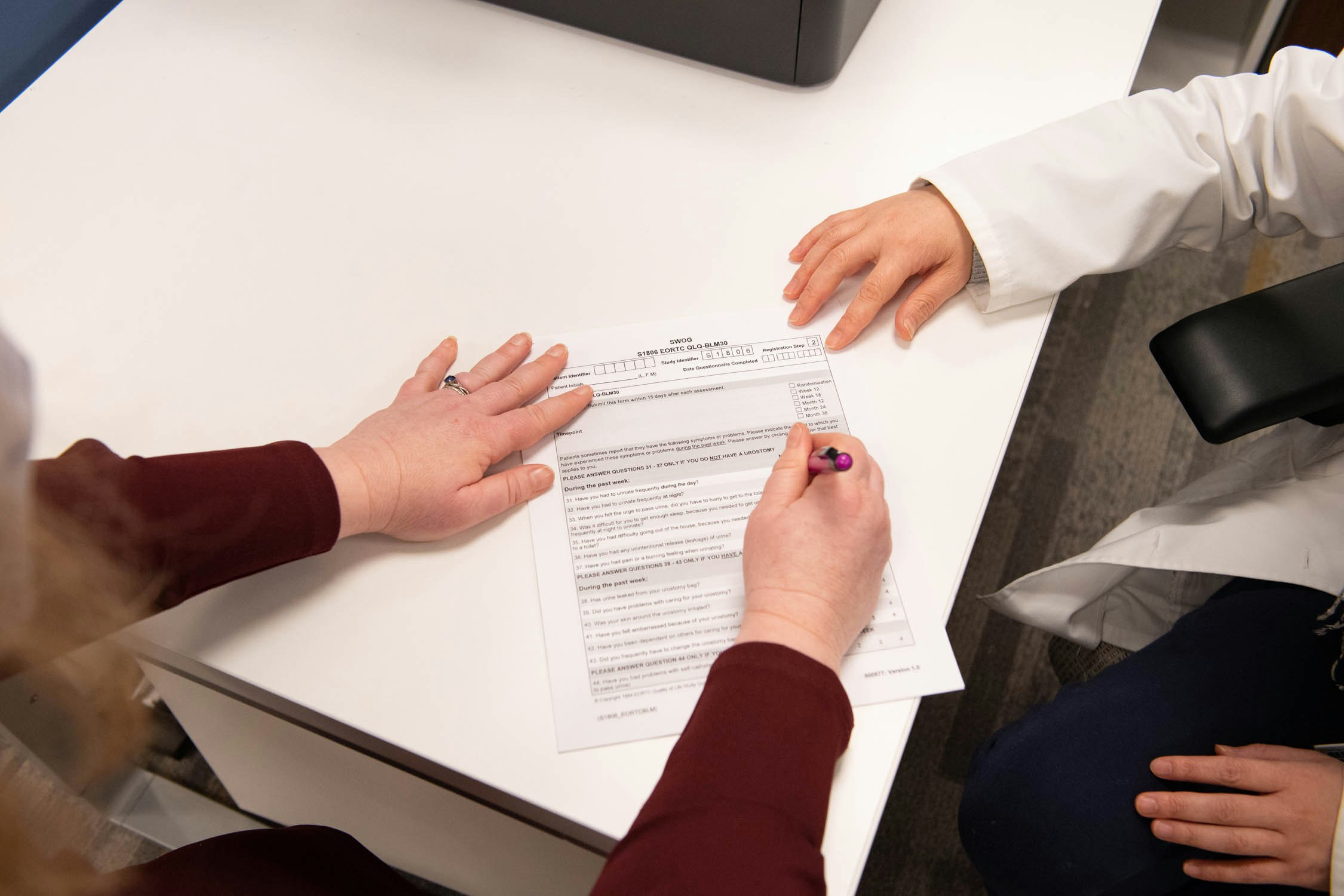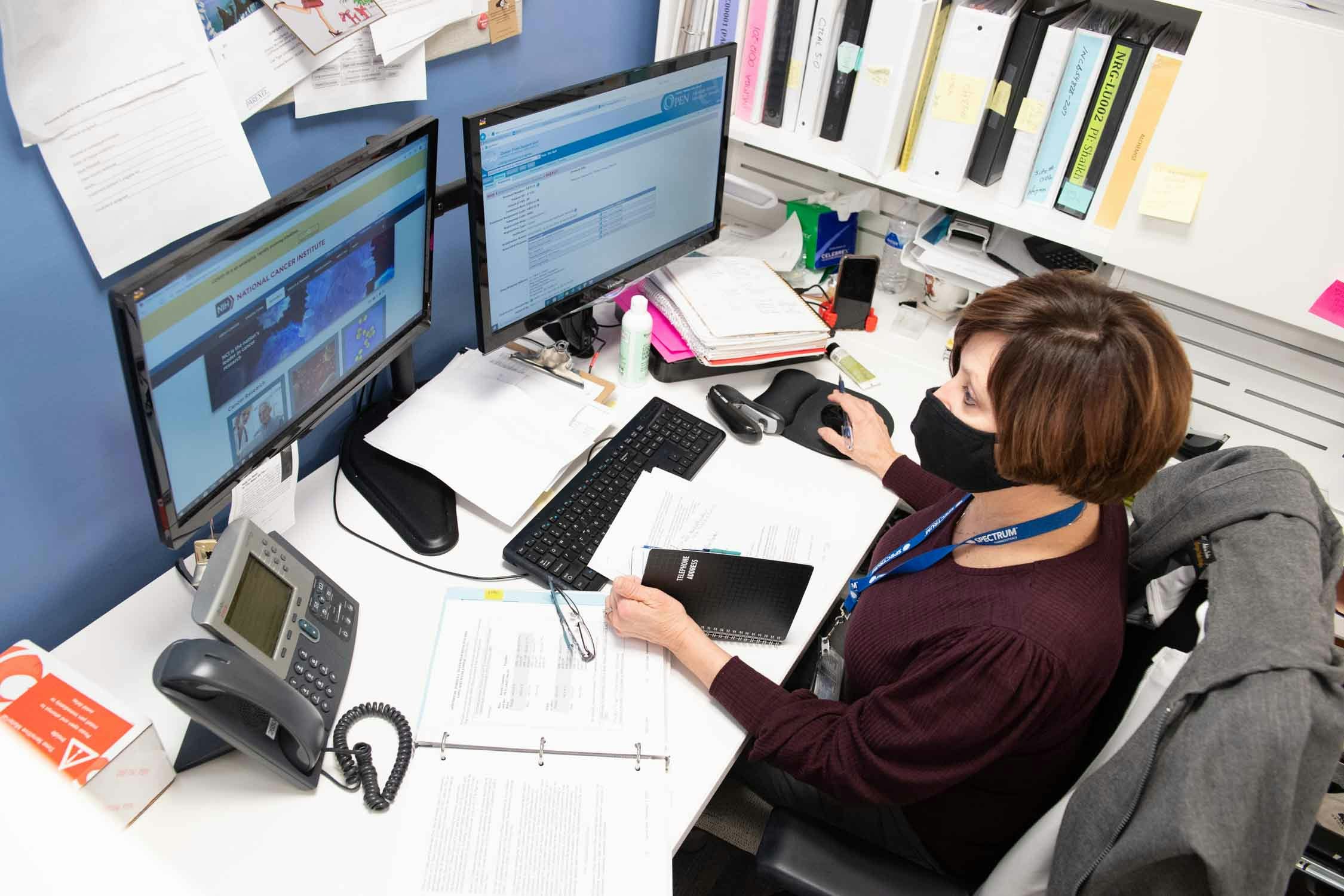Clinical Research: Advancing Cancer Care
Clinical research leads the way to better cancer care. At the WVU Cancer Institute, we believe research and service go hand in hand. That’s why we work tirelessly to give our patients access to groundbreaking care through clinical trials in Morgantown and at convenient locations throughout the region.
As the area’s leading center for oncology clinical trials, the WVU Cancer Institute prescribes the latest, most innovative breakthroughs in cancer care. Our work helps save lives today – and paves the way for new, lifesaving discoveries for cancer patients of tomorrow.
Understanding Clinical Trials
If you’ve ever taken any prescription or over-the-counter medicines, even ibuprofen, then you’ve benefitted from the clinical trials process.
Clinical trials are closely monitored medical research studies involving volunteers. These studies typically involve between fewer than 50 participants to several thousand, depending on the phase, or level, of the trial. Findings from clinical trials help medical researchers better understand how a drug or medical procedure may impact patients.
Typically, new drugs and procedures must successfully flow through three trial phases – showing both effectiveness and safety in each – before being approved by the Food and Drug Administration (FDA) for widespread medical use.
In terms of cancer care, clinical trials allow our research teams at the WVU Cancer Institute to examine the effectiveness and potential side effects of new treatment options, including newly developed chemotherapy drugs, cutting-edge immunotherapies, and new, less invasive surgical procedures for tumor removal.
“Clinical trials allow us to move toward the next generation of care,” says Anne Michels, BSN, RN, MBA, CCRP, director of the WVU Cancer Institute’s Clinical Research Unit.
An Opportunity to Serve
As West Virginians, we know about the power of neighbors helping neighbors. It’s at the core of who we are. “The altruism belief is so deep here,” Michels says.
Clinical trials offer an ideal opportunity to tap into that service mindset and help others. They let patients turn the negative news of their cancer diagnosis into a potential positive: lasting, long-term advances toward better treatments to come.
In her more than 20 years overseeing clinical trials in oncology, Michels has seen firsthand how research at the WVU Cancer Institute has helped improve cancer care for those living in Appalachia and beyond.
“Cancer care today is a completely different model than it was 20 years ago – both in terms of the interdisciplinary approach we take today, as well as the many different treatment options that are now available,” she says.
Patients today have access to oral chemotherapies and more targeted, “precision” immunotherapies, for example, thanks to the volunteerism of previous clinical trial participants.
“Drugs that we were testing in clinical trials 20 years ago have now become the standard of modern cancer care. They’re now the norm,” Michels says.
In the same way, today’s clinical trial participants have an opportunity to help forge the future of cancer care. “Clinical trials have provided many answers, but there are still so many more questions to explore,” Michels explains. “We’ve got a lot more to learn about what is possible.”
Eligibility for Clinical Trials
Our team understands that clinical trials are at the heart of all medical advances. We work to provide as many clinical trial opportunities as possible for our patients. Our primary research focuses on the types of cancers most commonly affecting West Virginians and Appalachians. These include lung, breast, prostate, and colon/rectal cancers.
Typically, patients will be informed by their physician or a member of their clinical care team if they are a candidate for a current clinical trial.
We are always actively recruiting clinical trial participants, so patients are encouraged to ask their care team about currently open research opportunities. You may also search online for current clinical trials underway at the WVU Cancer Institute. Or, view a comprehensive list of available clinical trials throughout the country at clinicaltrials.gov.
Your care team can answer any questions you may have about the length of the trial, costs (usually limited to insurance co-pays), and potential benefits and risks involved.
Please be assured that if you enroll in a clinical trial, you will receive attentive care and careful monitoring to ensure your safety. You’ll also have the option to stop participating in the clinical trial for any reason at any time.
Questions to consider:
Before you enroll in a clinical trial, ask yourself the following questions:
- Do I want to have access to the most innovative treatment for my condition?
- Have I already exhausted all the current, widely available treatments for my condition?
- Do I want to help others understand more about cancer?
- Would I like to help myself and others dealing with cancer?
If you found yourself answering yes to these questions, please consider volunteering for a clinical trial.
Clinical Research Locations
Our clinical research occurs at the WVU Cancer Institute’s flagship location in Morgantown, as well as several accessible satellite locations throughout the state, including Berkeley Medical Center, United Hospital Center, Camden Clark Medical Center, and Wheeling Hospital.
“Medical research has proven time and again that having access to clinical trials improves the quality of care that patients can receive,” says Michels. “That’s why we make it a priority for patients across the state to have the same access to cutting-edge treatment and research as those who live close to Morgantown.”
Each of our clinical research locations is staffed by full-time research nurses alongside a dedicated team of medical, surgical, and radiation oncologists.
Working for You
Our work at the Clinical Research Unit goes beyond clinical trials – though they are a key part of our mission. Our research involves all aspects of cancer diagnosis, treatment, and prevention. And our efforts help ensure that patients have access to world-class cancer care close to home.
“In addition to clinical trials, our work includes palliative care research, as well as cancer prevention,” Michels says. “We regularly work in collaboration with medical, surgical, and radiation oncologists. But our work is not just on new cancer drugs. We have also worked on new therapeutics for pain control and nausea control for cancer patients. We also partner with a vast team of cancer support specialists, including exercise physiologists, nutritionists, and pain management specialists. Our mission, really, is to support well-rounded care for our patients.”


